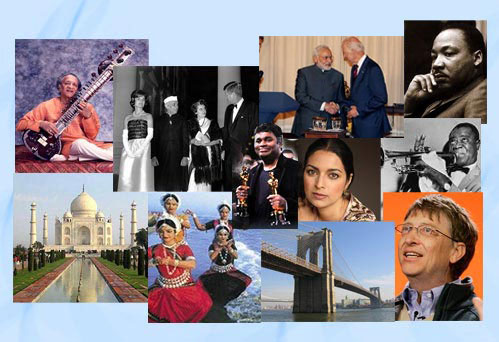 |
 |
 |
|
|
| Press Release |
| SUNDAY, NOVEMBER 28, 2010 |
| Future of India-US Relations |
|
(Summary of the talk by Nicholas Burns formerly US Under Secretary of State and Dr. Shashi Tharoor, Formerly MOS (EA) organized by Aspen Institute, India, July 22, 2010) Many world leaders and political commentators have spoken about the emergence of India as a major global player in the 21st century .The US too has stressed the importance of a strategic relationship with India. This was the topic of a talk organized by the ASPEN Institute, India on the 22nd of July at the WWF hall on Lodhi Road, New Delhi, India. The talk featured Nicholas Burns, the former Under-Secretary of State in the Bush Administration and Dr. Shashi Tharoor, former MOS (EA) & currently Member of Parliament. After a brief introduction by Tarun Das, formerly Mentor of the CII, Nicholas Burns broadly touched upon the visible progress achieved in Indo-US relations in the last ten years or so.Acoording to Burns, most Americans now consider and believe India to be the next Global Superpower and stressed the bipartisan realization by both the Republicans and Democrats that relations with India are of paramount importance. As he lightly put it, “there are very few things that they agree on [Republicans and Democrats], but this relationship with India is one on which they are in complete agreement. He noted that people to people contacts were a major reason for the positive change in Indo-US relations. He also acknowledged the significant role played by the Indian American community which has emerged as one of the most successful communities in terms of per capita GDP in America. As he put it, "[Indian Americans] are unusually successful". He highlighted the Civil Nuclear Agreement as an example of the progress India and America had made in their strategic relationship under the presidency of George W Bush. To allay the concerns that many Indians have voiced in recent times, he stated that President Barrack Obama considers India to be a "strategic priority" and this was reflected by his invitation to the Indian PM, Dr Prime Minister Manmohan Singh to be his first Official State Guest in November of 2009. As for the future of the relationship, Nicholas Burns felt that there ought to be a strong impetus from both sides to define the strategic partnership and agree on what it entails. He went on to add that India is too big and too proud a country to be categorized as an ally or an uneasy partner. He was of the opinion that India should recognize her role as a growing global power which has ambitions to become a Permanent Member of the United Nations Security Council. Personally, he believed that India should be a permanent member of the UNSC. Finally, Burns noted that both countries need to be bold in defining and carrying forward this relationship. He called it a "unique relationship" and stated that there is no existing model that can be copied for framing this relationship. He hoped the relationship between India and the US will witness "major steps forward" rather than incremental changes. Dr. Shashi Tharoor who spoke after Nicholas Burns agreed with most of what the former Under Secretary had said and complimented him:“Nicholas Burn’s remarks are spot on”. He stressed that the Indian Diaspora is India’s biggest asset and that these people have the clout to advance India’s interests in the US. He added that even the American Political Class has taken notice of the incredible “fund raising prowess” of the Indian American Community. Tharoor felt that this community is probably second only to the Jewish American Community when it comes to lobbying for their interests. While not dismissing Nicholas Burns’s rather rosy picture, Dr. Tharoor drew attention to some problem areas. He stated that, regrettably, India continues to be still seen through the prism of other relationships. He noted that Indians do not agree with the sentiment doing the rounds in the US that India could potentially be used as a “counter weight” to China. Besides,, the ongoing close cooperation between the Defence Establishments of the US and Pakistan raises concerns in India and leads to the belief that the US values Pakistan as a closer ally. Dr Tharoor went on to state that India has always been independent in her decision making and will continue to make autonomous decisions. He highlighted certain points that India and the US should concentrate on:
However, the former MOS (EA) emphasized that democracy should not be "thrust" upon other countries as the US has been doing recently. He alluded to democracy as love and said that "it should come from within." He agreed with Nicholas Burns that India deserves a seat in the UNSC and that there should be meaningful reform in the UNSC to keep pace with the new dynamics in the world. |
| Copyright © 2011 Indo-American Friendship Association, New Delhi chapter. All rights reserved. |
| Maintained by Communications Advisor: Jasmeet Pal Singh |
